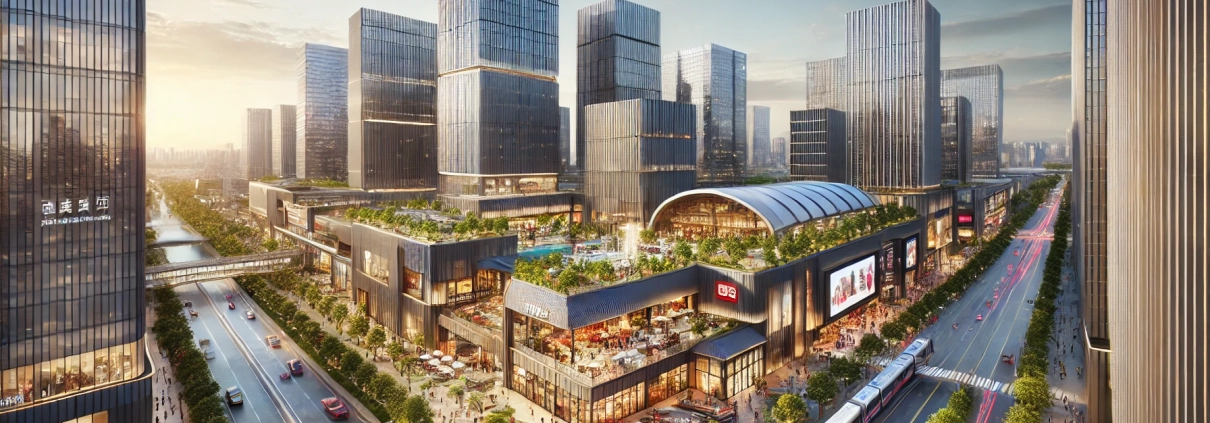Super-Regional Mall
This retail subtype has a higher variety and assortment of tenants than regional malls. They have an average trade area of 5 to 25 miles and average over 1,000,000 SF in size. Typical anchor types reflect the same as found in regional malls.
Source: ICSC
Putting ‘Super-Regional Mall’ in Context
Overview
Gateway Heights Mall is a 1.2 million square foot super-regional mall located in downtown Salt Lake City, Utah. Acquired by Summit Capital Partners, the mall represents a core-plus investment opportunity due to its strong tenant mix, established market presence, and potential for revenue growth through strategic leasing and operational improvements.
The Property
The mall features over 200 tenants, including three major anchors: a luxury department store, a large-format electronics retailer, and a popular fast-fashion brand. Additionally, the mall houses several high-end dining options, a multi-screen movie theater, and a prominent outdoor plaza for seasonal events. Gateway Heights Mall serves a trade area of approximately 20 miles, reaching a population of 1.5 million residents.
Investment Context
Summit Capital Partners acquired the mall for $275 million at a cap rate of 6.5 percent. The property generates a net operating income (NOI) of $17.9 million annually, with upside potential from 100,000 square feet of underutilized space currently available for lease. The firm plans to reposition this space by targeting experiential retail tenants such as fitness centers and boutique entertainment venues to align with shifting consumer preferences.
Key Considerations
– The mall benefits from its downtown location and excellent transit connectivity, with a nearby light rail station and ample parking.
– Summit Capital Partners has budgeted $15 million for renovations, focusing on common area upgrades, digital signage, and enhanced outdoor spaces to attract higher foot traffic and tenant retention.
– The firm projects a five-year IRR of 12 percent, factoring in incremental NOI growth from the leasing of underutilized space and modest rental rate escalations.
Conclusion
Gateway Heights Mall exemplifies a super-regional mall by providing a vast assortment of retail, dining, and entertainment options. Its scale, trade area, and diversified tenant base make it a stable yet dynamic investment for a core-plus strategy. By leveraging the property’s existing strengths while addressing underutilized areas, Summit Capital Partners aims to achieve sustainable growth and value creation.
Frequently Asked Questions about Super-Regional Malls
What defines a super-regional mall?
A super-regional mall is a retail subtype that offers a broader variety and assortment of tenants than regional malls. These properties typically exceed 1,000,000 square feet in size and serve a trade area of 5 to 25 miles.
How does Gateway Heights Mall meet the criteria of a super-regional mall?
Gateway Heights Mall spans 1.2 million square feet, houses over 200 tenants, and serves a 20-mile trade area with a population of 1.5 million—placing it firmly in the super-regional mall category.
What types of anchor tenants are found in a super-regional mall like Gateway Heights?
Typical anchors include department stores, electronics retailers, and fashion brands. At Gateway Heights, examples include a luxury department store, a large-format electronics retailer, and a popular fast-fashion brand.
How does the trade area influence the mall’s performance?
With a 20-mile trade area and access to 1.5 million residents, Gateway Heights benefits from strong consumer traffic, supporting its retail, dining, and entertainment offerings.
What was the acquisition strategy for Gateway Heights Mall?
Summit Capital Partners pursued Gateway Heights as a core-plus investment, acquiring it for $275 million at a 6.5% cap rate and targeting value creation through leasing and renovations.
What improvements are planned for Gateway Heights Mall?
Summit Capital budgeted $15 million for upgrades including common area renovations, digital signage, and enhanced outdoor spaces to improve foot traffic and tenant retention.
How does Summit Capital plan to increase the mall’s NOI?
The firm aims to lease 100,000 SF of underutilized space to experiential tenants and implement modest rental rate escalations, targeting a projected five-year IRR of 12%.
Click here to get this CRE Glossary in an eBook (PDF) format.

